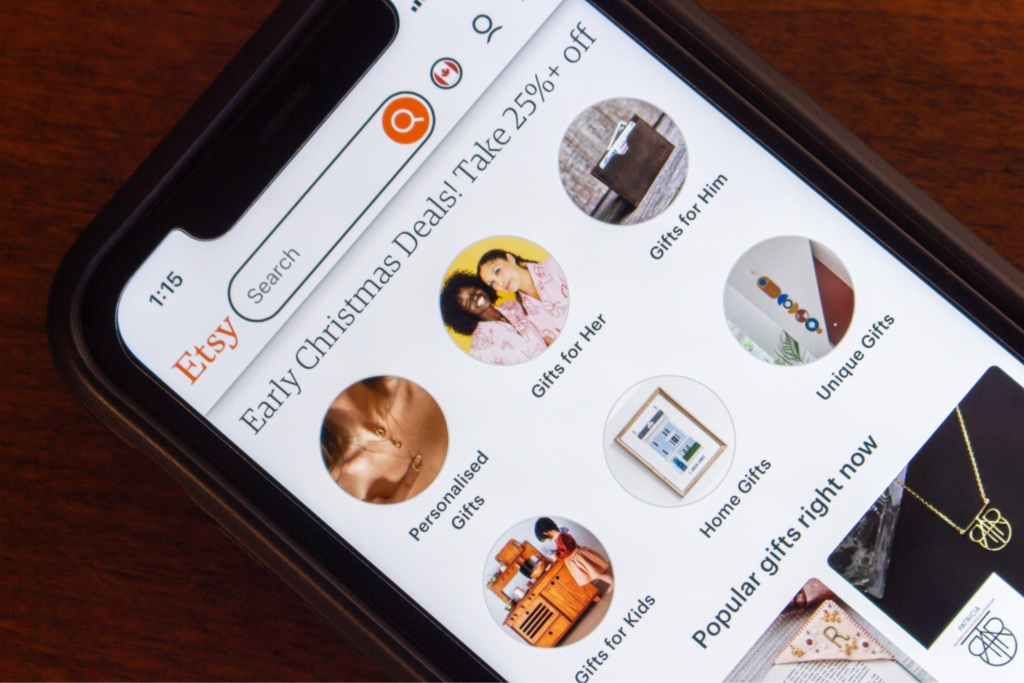Printify + your favorite platform = more sales!
Etsy is the most popular marketplace for selling vintage and handmade items. Part of its popularity is its ease of use and absence of monthly subscription fees.
But is the platform the best place for your online store? There are factors to be considered when opening an Etsy store, including fees, competition, and suspension of accounts.
We’ll review your online store’s ten best Etsy alternatives, including marketplaces, eCommerce platforms, and website builders. Ultimately, you’ll be able to make an informed decision if Etsy is still the right choice for your online business.
Why switch to an Etsy competitor

The Etsy platform is an excellent option for small business owners, but some factors make it not the ideal platform for many sellers.
In the following, we’ll see the main reasons some sellers consider other options for selling online, fully replacing an Etsy shop or opening a store on another platform simultaneously. You can also weigh additional pros and cons and consider – is selling on Etsy worth it?
Fees
Many current Etsy store owners were caught off-guard by increased selling fees in 2022 and needed to re-evaluate their products and prices and consider an alternative marketplace.
Etsy doesn’t charge a monthly membership fee or a subscription. However, it charges various fees for listing and selling products, in some cases making them unprofitable.
While Etsy fees are low enough for newbie sellers, they accumulate when the business grows. The platform’s expenses can become more significant than those of some competitors.
That happens especially with Etsy Off-site ads, a program from which sellers cannot opt out after reaching a set sales threshold.
Check a comprehensive and up-to-date discussion on all Etsy fees and Etsy off-site ads on our blog.
Competition
Many small businesses are attracted to the Etsy platform due to the absence of a monthly subscription fee or promises of easy money with dropshipping. That makes Etsy packed with merchants, many selling similar products, looking the same, and making it hard for newcomers to get visibility without Etsy ads.
If tweaking your Etsy SEO is not working, it may be time to look for an alternative.
Customization
Etsy’s customization possibilities are restricted if merchants don’t subscribe to Pattern, the Etsy service for creating your own website connected to the platform.
You can customize a shop in the Info & Appearance section by altering a store’s name and title, adding an icon, a banner, photos, and customizing announcements. It’s also possible to create a list of featured items and rearrange some listings, but that’s it.
Suspensions
Etsy is a closed environment with its own rules and terms of use. That makes it easier for sellers to inadvertently break some rules without knowing it and have their accounts suspended or even canceled without warning.
Sometimes the suspensions look arbitrary – some Etsy sellers have their accounts frozen while adding products from print on demand. Others, during the process of confirming bank accounts.
In any case, they are annoying and a nuisance for those merchants genuinely trying to create a respectable business in the marketplace.
Etsy alleges that emails are sent explaining the reasons for the suspension, but that is not always the case, and their customer support can take a long time to address such issues.
Make it happen today!
Top 5 Etsy alternatives among online marketplaces
Next, some of the top Etsy alternatives among marketplaces.
eBay
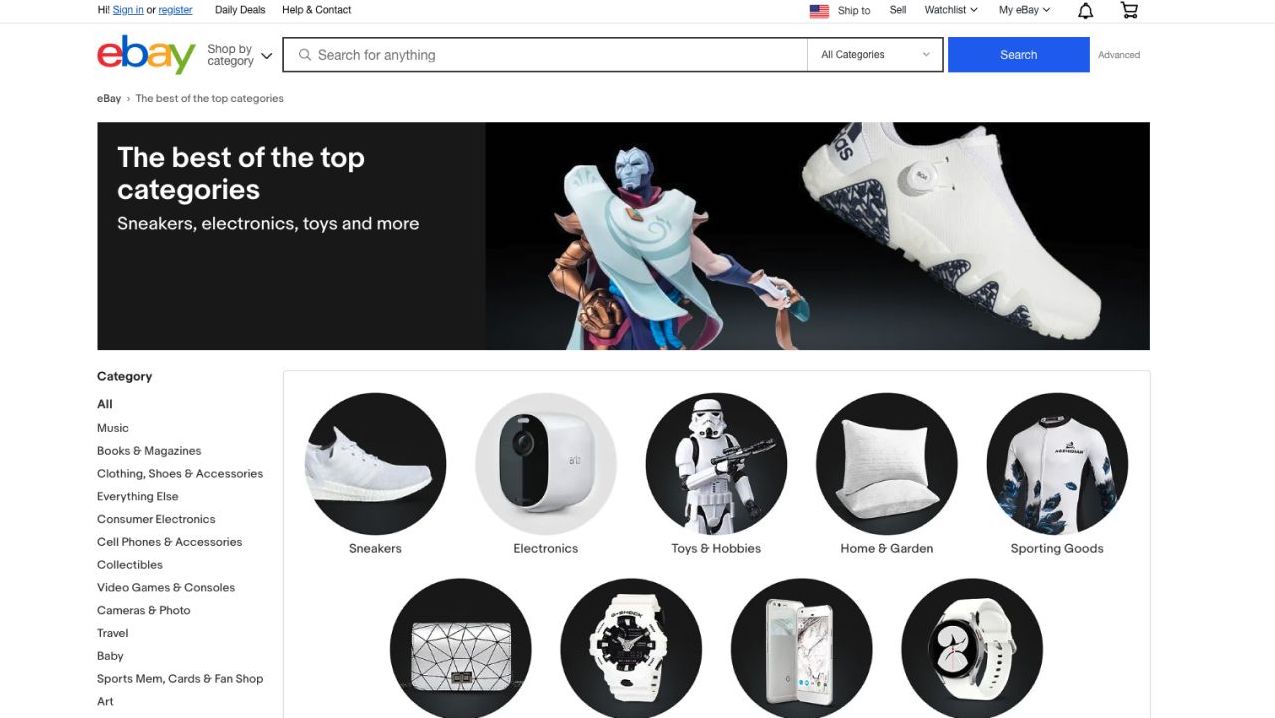
eBay was the first auction website and is one of the oldest online marketplaces. Depending on the seller, products can be sold immediately with the Buy It Now button or by the highest bid. Buyers look to eBay for good deals and a variety of products – almost anything can be found in the online marketplace.
Setting up an account with eBay for occasional buying or selling is simple and needs only registering an email and some personal data.
Creating a regular eBay store requires subscribing to a paid plan. The basic setup is simple, but the process may get complicated for some users due to the internal rules and thresholds. Account suspensions are frequent, and sellers must keep up to date on internal platform policies.
Unlike Etsy, eBay lets first-time sellers offer only up to five products, upgrading after some months.
eBay listing fees are called insertion fees – they decrease according to the store plan and work differently from Etsy listing fees depending on the item. Insertion fees can reach zero over time. We recommend reading eBay’s guide on insertion fees for a detailed explanation of the intricate system.
There are a few customization options. Store owners can personalize the description, logo, banner, and picture, while listings have photos, titles, descriptions, colors, and sizes.
eBay offers selling templates for creating similar listings, and the Manager tools let users monitor sales and edit listings. The mobile app can do most of the marketplace selling and management.
eBay may be a suitable Etsy alternative, depending on the sales volume. It is also possible to dropship with eBay and integrate it with Printify.
Check out more about Etsy vs eBay on our blog.
Pros:
- Consolidated traffic and attendance
- Auctions allows increased profit from single listings
- Simple setup
Cons:
- Limited customization
- High competition for regular listings
- Complex policies and rules can lead to account suspensions
Pricing:
(paid every month)
- Starter – $7.95 per month. For beginner sellers with few products.
- Basic – $27.95 per month. Adds benefits such as more insertion fee credits, fee discounts, or coupons.
- Premium – $74.95 per month. This plan offers more zero insertion fee listings, lower fees, and more business tools. Intended for merchants with a considerable number of listings.
- Anchor – $349.95 per month. Adds dedicated customer support and a reduced final value fee cap. Intended for merchants with high-volume sales.
- Enterprise – $2,999.95, available yearly. Intended for merchants with extensive catalogs. Builds on the previous plan with an increased allowance for zero insertion fee.
Fees:
- Insertion Fee – $0.35 per listing
- Final Value Fee – varies according to the product. Normally 12.9% to 15% of the product price.
Check out our blog on eBay compared to Shopify.
eBay’s subscriptions and fees pages have a complete list of fees, subscription costs, and functions.
Walmart
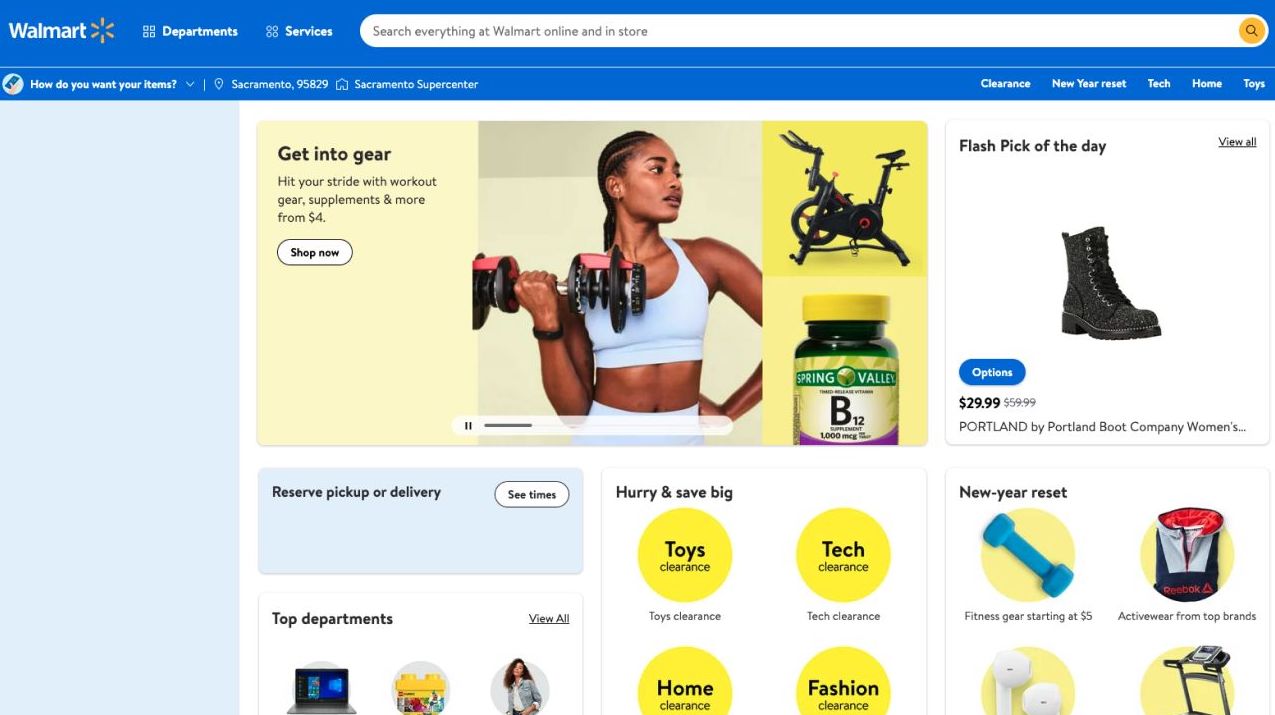
Walmart is the second largest retailer in the US and one of the best alternatives to Etsy for sellers who want to expand to marketplace selling.
Individual Etsy sellers willing to join the Walmart marketplace must pass a complex business verification process. Afterwards, they set up payment and shipping.
To pass the business verification, sellers provide a business tax ID or a business license number with supporting documents. All products need to have GTIN/UPC GS1 company prefix numbers and should comply with Walmart policies.
In addition, the online marketplace requires a proven history of eCommerce success.
Walmart doesn’t require subscriptions or listing fees. Transaction fees are replaced by a general referral fee that varies depending on the product category. Most products receive a 15% referral fee.
Integration with Walmart is done chiefly via solution providers, an API connection, or authorized partners.
Pros:
- Access to the second largest market in the US
- No monthly fee or subscriptions
- High trust in the marketplace among customers and developed structure
Cons:
- Demanding admission process for sellers
- Huge competition
- No standalone store and few customization options
Pricing:
- No monthly subscription
- Referral fees per transaction – 15% for most items.
Storenvy
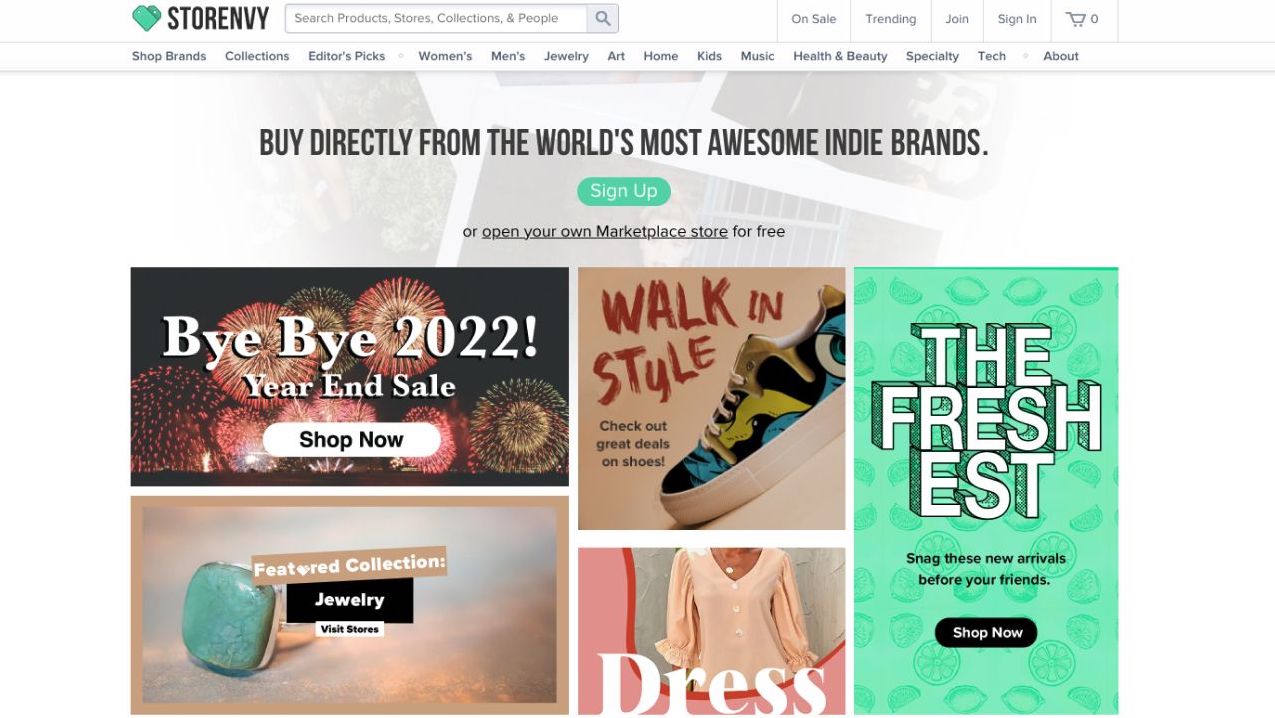
Storenvy is an Etsy alternative with curated aesthetics focused on Indie brands, handmade products, and younger demographics. It is the best option for selling unique, vintage, or high-quality goods in your own online store while benefiting from a marketplace audience.
Sellers can set up a free online store or a social marketplace store and join up to three predetermined markets such as “Art & Prints,” “DIY & Supplies,” “Electronics, Gadgets and Accessories,” “Food,” or “Vintage.”
The market offers good customization options, including themes, changing fonts, colors, headers, and backgrounds.
Storenvy offers promotional tools such as “managed marketing,” advertising products on Google, Facebook, or Opensky, and gives a limited number of discounts and promotions according to the plan.
All the basic functions are available in the free plan. Storenvy charges a 15% commission on sales in place of listing and transaction fees.
Pros:
- Less saturation and competition than other marketplaces
- Higher product prices
- Allows creating your own website with no additional costs
Cons:
- Limited audience
- High selling commission
- No control over the marketing tools and strategies
Pricing:
(paid every month)
- Free plan – Up to 20 products
- Artisan plan – $9.99. Up to 100 products
- Growth plan – $24.99 per month. Up to 500 products
- Professional plan – $49.99 per month. Up to 5,000 products
Fees:
- 15% transaction fee
Amazon Handmade
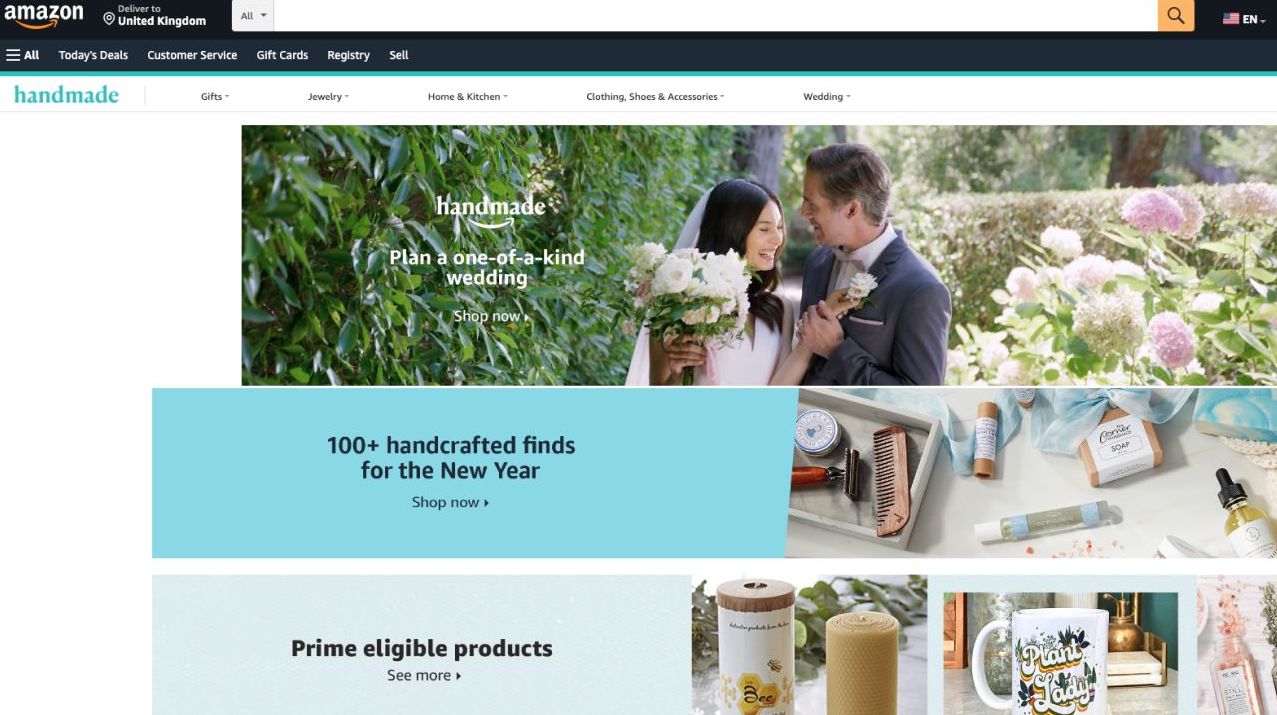
Amazon Handmade is the giant’s iteration for selling handmade goods, including jewelry, handbags, apparel, and wedding accessories.
Amazon Handmade sellers have access to the indisputable first eCommerce option in the world. That comes with pros and cons – worldwide exposure means competition with millions of merchants selling cheaper and often lower-quality products.
To start selling at Amazon Handmade, sellers must first have an Amazon Professional selling account with a monthly fee of $39.99 per month. However, this fee is waived one month after the seller is approved.
No additional subscription is charged for those selling only handmade products, except for entrepreneurs selling more than 40 products in other categories. In that case, the seller must pay the monthly subscription again.
In addition, Amazon charges 15% of fees per transaction and demands considerable maintenance of a non-customized storefront.
Unlike Etsy, Amazon Handmade offers advanced marketing tools.
Amazon Handmade is an Etsy alternative for full-time sellers faithful to the original Etsy handmade crafts focus, willing to remain in an online marketplace and use an automated fulfillment system. Part-time sellers may find it too costly and demanding.
Pros:
- Selling in the largest marketplace in the world
- Fulfillment and ads by Amazon
- Listings don’t expire
Cons:
- Hefty competition with cheaper products
- Long application process for new merchants and strict internal rules
- High fees
Pricing:
- $39.99 per month – for users selling more than 40 products in categories other than Handmade
- Referral fee of 15% per transaction
Bonanza
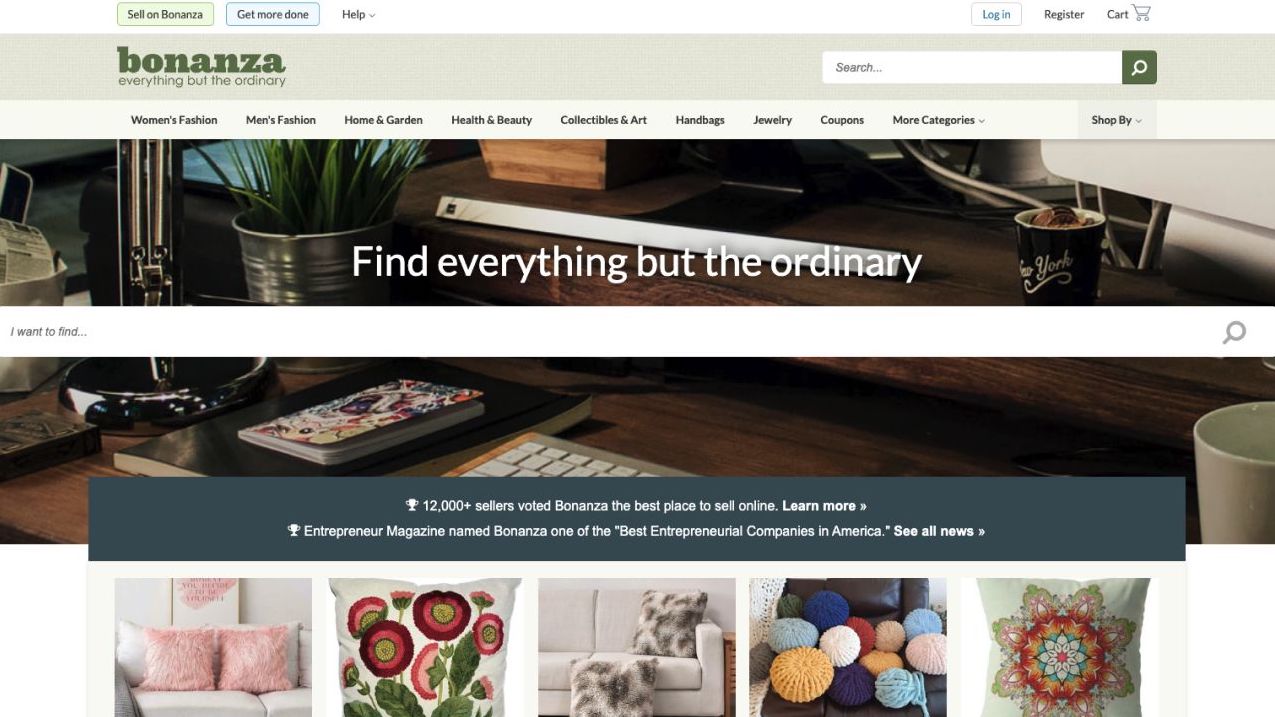
Bonanza is one of the top Etsy alternatives, as it allows selling for free with lower transaction fees. It charges transaction fees of $0.50 + 3.5% of the item price but no listing fee.
The platform lets users build a standalone store, but the tools for that purpose are limited and not very user-friendly.
Bonanza looks and functions similarly to eBay but focuses on unique items. It imports items from Amazon, Google Shopping, eBay, Etsy, Shopify, or from an inventory file. Many searches on the platform redirect users to eBay results.
Traders in Bonanza are expected to negotiate prices. When selling on the platform, remember to add some wiggle room.
The platform offers marketing tools and analytics within the free plan, while the membership plan gives sellers more selling and marketing features. Unlike Etsy, Bonanza offers abandoned carts to sellers.
Pros:
- Expanded reach through Google Shopping and eBay
- Built-in marketing features like abandoned cart
- Low selling fees
Cons:
- Limited customization
- Adding options and getting noticed greatly increases costs
- Buyers are used to negotiating and bargaining for lower prices
Pricing:
- Free
- Membership plan – $25 per month
Fees:
- $0.50 + 3.5% of purchase price advertising fees
Make it happen today!
5 Best standalone online store alternatives to Etsy
Etsy sellers who want ownership of their online stores and to reach other sales channels should consider creating their businesses with a website builder or standalone platform. Here are the best standalone alternatives to Etsy.
WooCommerce
![WooCommerce 10 Best Etsy alternatives for your online store in [bp_year] 1](https://printify.com/wp-content/uploads/2025/02/WooCommerce-1024x576.png)
WooCommerce started as an open-source plugin for adding eCommerce functionality to WordPress.org websites. It grew to a full-fledged eCommerce platform that moved more than 28% of the global eCommerce market in 2022.
WooCommerce charges no monthly fee or subscription but requires users to provide hosting. Also, some plugins and themes may require subscriptions or one-time payments. Experienced users may benefit significantly from customization possibilities but must plan for eventual costs.
Besides the user’s skills and budget, there are no limits to WooCommerce’s business capabilities. Every function can be added to a standalone eCommerce website with a suitable theme and plugin.
There are plugins for SEO, email marketing, dropshipping, or taxes, most with free plans with basic features. Any seller can build small to middle-size stores with WooCommerce’s free themes and plugins, plus some dedication to learning how to operate the system.
WooCommerce benefits from a vast network of payment gateways and built-in WooCommerce payments, which receives payments in over 135 currencies but only works in 18 countries.
WooCommerce may be the best Etsy alternative if you are keen to sell online in your own store. It offers the unique combination of full ownership of the online store associated with no monthly subscriptions. However, it has a steep learning curve.
Learn how to build a WooCommerce online store, choose from the 30 best themes for WooCommerce, and pick the best dropshipping and SEO plugins for it in our blog.
Pros:
- Full-ownership of your own online store
- Flexibility and scalability
- Ample option for secure payment processors
Cons:
- Steep learning curve
- Hidden costs with themes and plugins
- Requires regular maintenance and updates
Pricing:
WooCommerce is free, but requires hosting and a domain name. Themes and additional plugins may charge subscriptions or one-payment fees.
- Web hosting – From $1.99 per month
- Domain – From $0.99 per year
- Themes – From $24 per year
Shopify
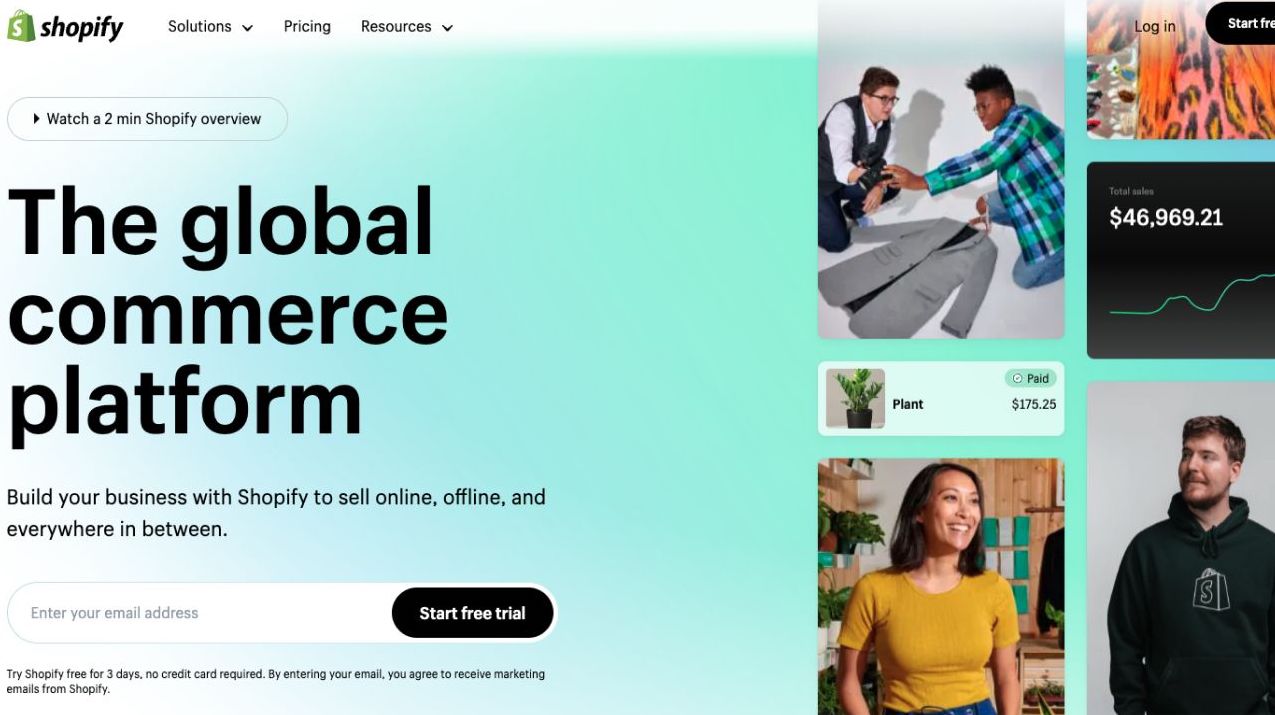
Shopify is an excellent Etsy alternative for sellers looking to create an online store outside a marketplace.
It is possible to migrate an existing website to Shopify, and all regular plans are packed with eCommerce features and can be expanded with third-party apps.
Shopify’s built-in features are considerable and include the following:
- A standalone online store
- Your own custom domain
- Unlimited products with a limited number of variations
- Sales channels
- Discount codes
- Abandoned cart and POS from the start
- Automations
- Internationalization, including currency conversion
- A broad range of payment processing options – including the proprietary Shopify payments and over 100 payment gateways worldwide
The Shopify drag-and-drop editor is reasonably user-friendly, although not the most intuitive on the market. Inventory management and promotional tools are well-developed.
Shopify Point-of-Sales (POS) works in all plans from the start, offering payment with mobile devices, offline payments, barcode labels, customer profiles, or tax calculations. A separate subscription to the Shopify POS Pro, for $60 per month, adds advanced features.
Shopify POS works with both proprietary and third-party hardware.
The Shopify app store contains thousands of apps that expand Shopify’s functionality. These apps allow escalating Shopify and adding every eCommerce function required, including marketplace selling or automating any shipping fee. However, relying too much upon apps is problematic, as most of them charge additional subscription fees and impact webpage speed.
Pros:
- Complete eCommerce functions
- Makes complex features easy to use
- Good range of payment options
Cons:
- Heavy dependence on third-party apps
- The editor could be more intuitive
- Undeveloped blog
Pricing:
(paid monthly)
Shopify doesn’t offer a free plan, but a 3-day free trial.
Regular subscriptions
- Shopify Basic – $29 per month
- Shopify – $79 per month
- Shopify Advanced – $299 per month
Special plans
- Shopify Starter – $5 per month. Embeds products in external sites and Social platforms; no standalone store.
- Shopify Lite – $9 per month. Adds the “Buy Button” to other platforms and Social networks. No standalone shop.
- Shopify Plus – from $2,000 per month. Custom solutions for enterprises.
BigCommerce
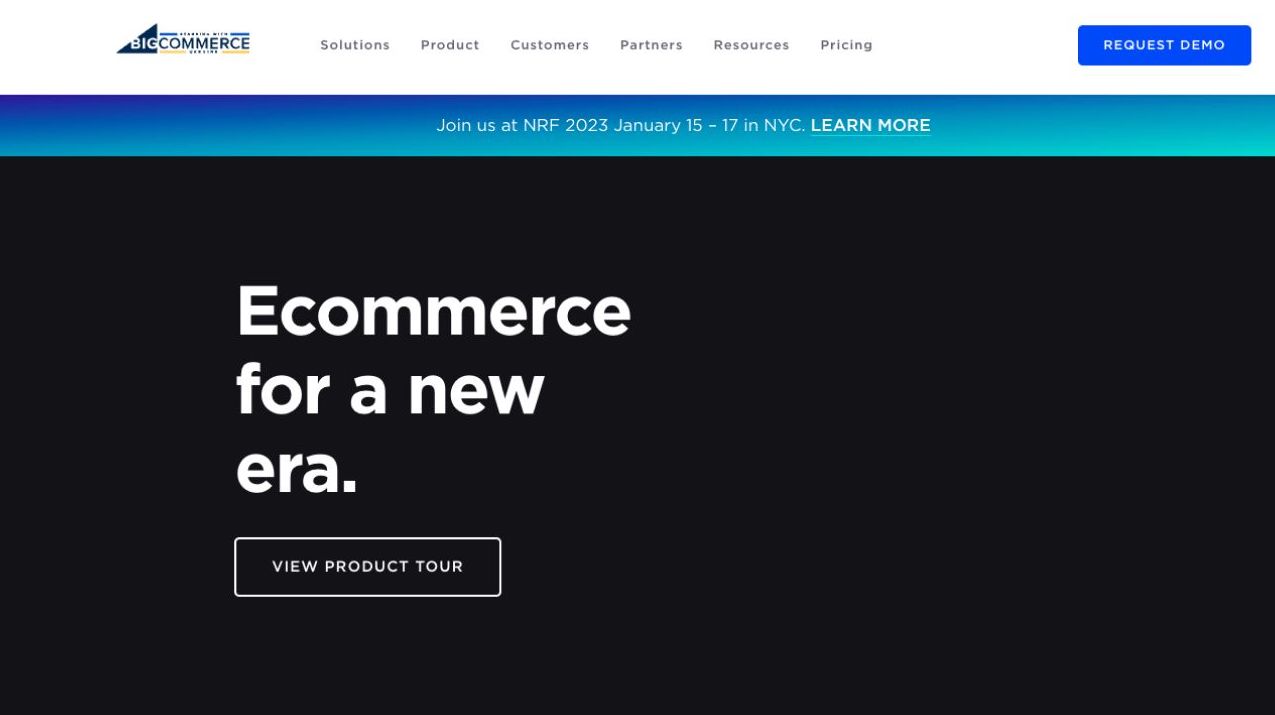
Another excellent Etsy alternative, BigCommerce competes directly with Shopify for the best dedicated online store builder.
The platform targets enterprise users and boosts customers like Fujitsu, General Electrics, Oral-B, Nikon, and the Smithsonian.
However, BigCommerce gives a generous amount of advanced eCommerce features for middle-sized businesses and customized solutions for those willing to escalate an eCommerce store.
The Standard plan offers unlimited products (up to 250 variations) with ratings and reviews, POS, sales channels (including Amazon and eBay), social media integration, and advanced reporting tools.
Abandoned cart, however, requires upgrading to the Plus plan.
All plans get real-time shipping quotes and multi-currency. The platform works with over 65 payment gateways, including Stripe, PayPal, Google Pay, Apple Pay, and Amazon Pay.
BigCommerce offers a dozen free themes and hundreds of premium themes, plus a drag-and-drop editor for customization. Many of these themes are variations of a default template.
The themes’ search engine lacks filters, the library often gets broken links, and getting a suitable theme is challenging.
There are only three filters – collections, industry, and price.
Except for the filter “industry,” which offers more than ten categories and some themes inside them, the other filters are limited. The price filter selects only between free and paid themes, while “collections” give very generic parameters like “B2B” or “Mega navigation.”
In addition to the search limitation, some free filters look more modern and beautiful than the most expensive ones, with apparently the same functionality. To discover the theme’s functions, users should open them one by one or check the showcase page.
Pros:
- Advanced eCommerce features from the start
- Over 65 payment gateways
- Scalable
Cons:
- Mandatory plan upgrades after reaching certain sales thresholds
- Inconsistent website performance
- An inconsistent and unreliable theme library with limited filters makes it difficult to set up the right storefront.
Pricing:
(paid monthly)
- Standard – $29.95 per month
- Plus – $79.95 per month
- Pro – $299.95 per month
- Enterprise – customized pricing
- Premium themes from $150 – 399
Wix
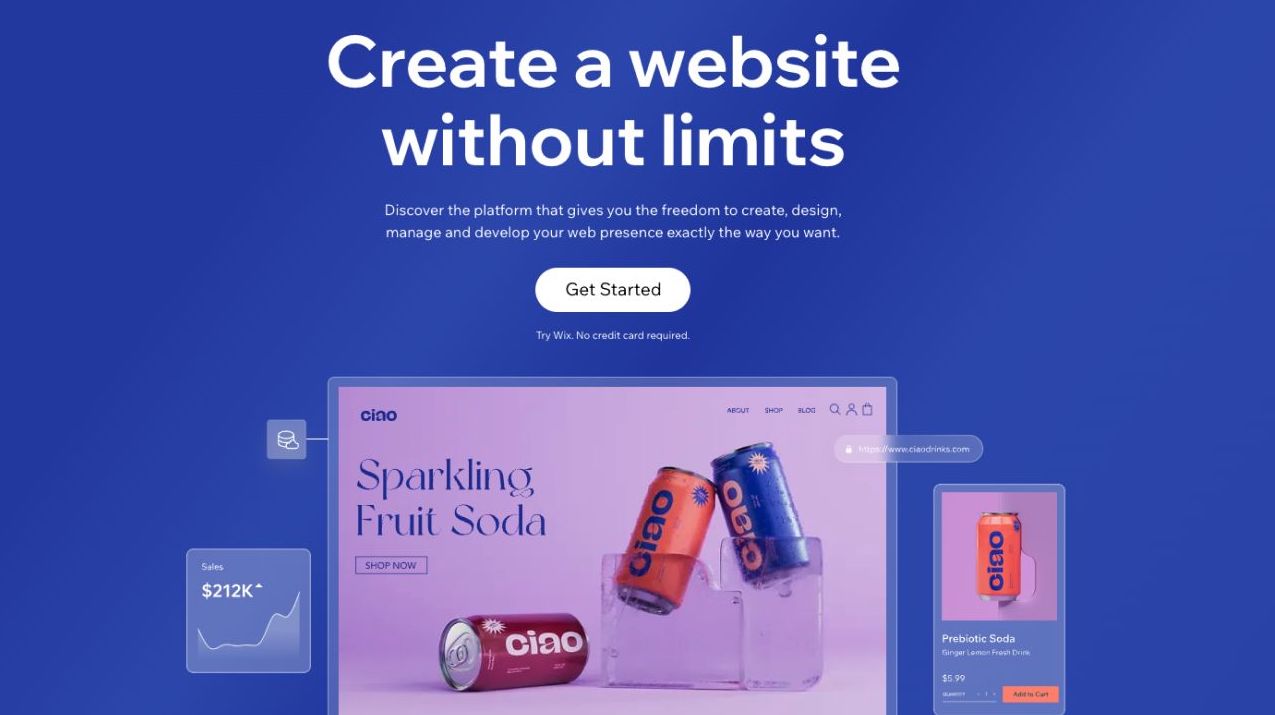
One of the best web builders available in the market, Wix is a great Etsy alternative for building your own site with a fully functional online store.
Wix offers several editors – the Wix editor (drag and drop editor), Wix ADI (an AI-driven editor), and the Velo editor, which allows editing HTML.
Wix stores offer many basic eCommerce functions built-in for subscribers of the premium business plans, and the Wix mobile app lets store owners manage the whole eCommerce site.
The suite Ascend by Wix adds marketing tools, SEO, and eCommerce options. Advanced features also require upgrading the ascend plan.
Built-in functions chosen during the initial setup of a new eCommerce site include a full-featured blog, forms, forums, and galleries.
The platform’s payment processors vary according to country. Wix Payments, the in-house solution, is not available worldwide, and other options are Stripe, PayPal, and Apple Pay. There are currently 22 payment gateways for US users.
Check the complete list of Wix Payment providers by country.
In 2022, Wix improved its POS considerably, expanding the attended countries and payment processors. Still, there is space for improvement as many countries are still not covered.
Currently, Wix POS works with Square, SumUp, and the Wix Mobile POS, enabling payments in more than two dozen countries. It is considerably more than Squarespace but still behind Shopify, BigCommerce, and WooCommerce.
Additionally, thousands of apps are available at Wix apps, allowing users to add any imaginable function to a website or online store, from video and media features to dropshipping integrations such as Printify.
Pros:
- User friendly and intuitive
- Packed with resources
- All eCommerce plans offer abandoned cart
Cons:
- Few payment options
- Mobile sites’ consistency and velocity need to be improved
- Advanced eCommerce, marketing, and SEO tools require subscriptions to Ascend plans in addition to a Premium eCommerce plan.
Pricing:
(paid monthly)
Wix Business plans
Wix offers several website plans and a free plan without eCommerce functionality. The business premium plans:
- Business Basic – $34 per month
- Business Unlimited – $38 per month
- Business VIP – $64 per month
Wix Ascend plans
Customer management, business and marketing tools, email marketing, and SEO.
- Limited plan – Free
- Basic plan – $12 per month
- Professional plan – $29 per month
- Unlimited plan – $59 per month
Squarespace
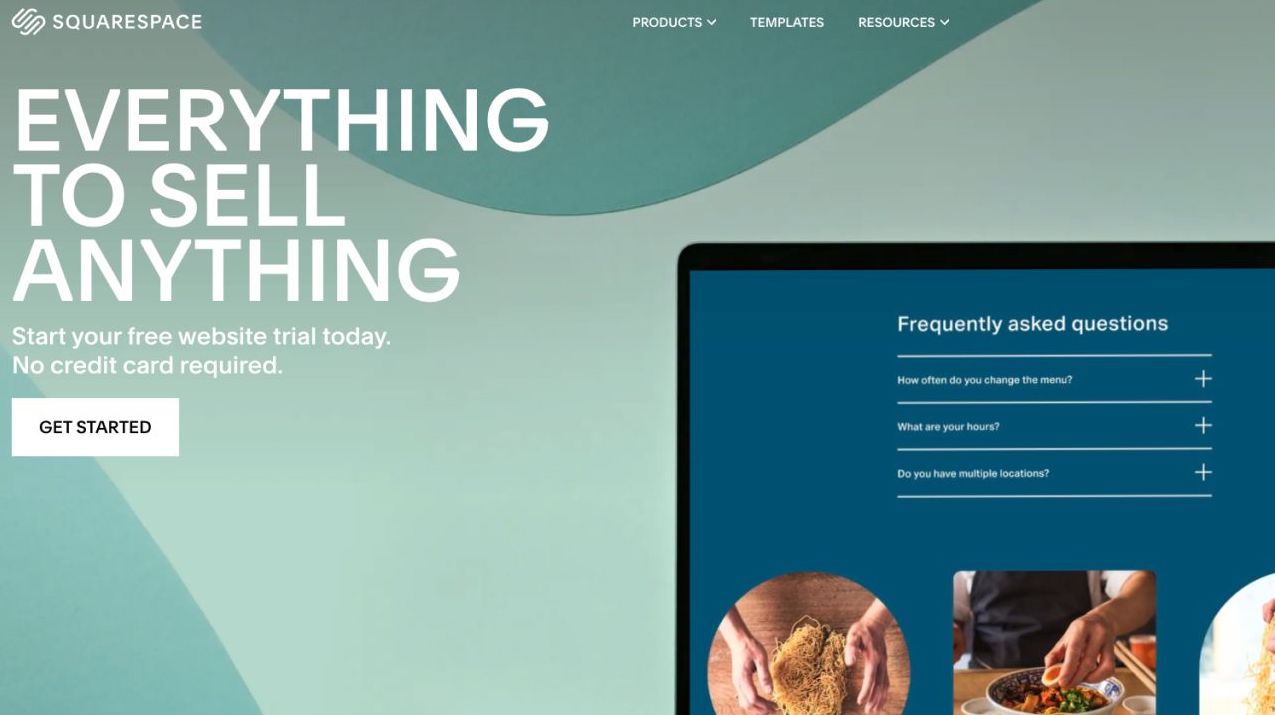
Another alternative to Etsy for web builders, Squarespace, is popular for those looking to replace an Etsy store with an eCommerce site built upon gorgeous templates and curated content tools.
Their eCommerce suite, however, offers fewer resources than other competitors.
Every Squarespace plan offers a one-year custom domain, basic SEO tools, and analytics. The eCommerce suite is available from the business plan. It offers unlimited products, dozens of extensions, and the Fluid engine – a drag-and-drop editor that is possibly one of the best on the market.
The builder has improved its inventory management tools and offers integration with Etsy, allowing sellers to sync Etsy inventory data.
Squarespace charges 3% transaction fees in the Business plan. Upgrading to the Basic Commerce plan removes the Squarespace transaction fee (payment gateways apply other commissions) and adds a limited POS. An abandoned cart tool comes only with the Advanced Commerce plan.
Stores designed with the website builder accept online payments—however, Squarespace partners with only two processors, PayPal and Stripe. Mobile users can pay with Afterpay and Celarpay through the mobile app. The POS works with Square, which accepts debit and credit card payments, UnionPay, and Apple Pay.
Despite the limited eCommerce functions, Squarespace is popular among creatives. Of all the Etsy alternatives, Squarespace resonates with the original Etsy audience for artsy and handmade goods.
It makes a fine choice for Etsy sellers from the US in those niches, but an online business looking to escalate may outgrow Squarespace.
Pros:
- User-friendly
- Edge on visuals and content
- Consistent and professional integrations
Cons:
- Limited eCommerce functions
- Few integrations
- Some functions offered by competitors in basic plans require Squarespace advanced plan
Pricing:
(paid monthly)
There is no free plan, but a 14-day free trial for every website.
- Personal – $23 per month – no eCommerce functions
- Business – $33 per month
- Basic Commerce – $36 per month
- Advanced Commerce – $65 per month
Make it happen today!
How to choose the right Etsy alternative for your business
Here are Etsy alternatives compared side-by-side, for your convenience:
| Type | Free plan | Subscription and fees | Standalone eCommerce site | Store customization | |
|---|---|---|---|---|---|
| eBay | Marketplace | ✅ | Store plans from $7.95 / Initial $0.35 insertion fee per listing / 12.9-15% final value fee | ❌ | ❌ |
| Walmart | Marketplace | ✅ | 12-15% referral fees | ❌ | ❌ |
| Storenvy | Marketplace | ✅ | Plans from $9.99 / 15% selling commission | ✅ | ✅ |
| Amazon Handmade | Marketplace | ✅ | Plans from $39.99 (waived after on month)/ 15% referral fee | ❌ | ❌ |
| Bonanza | Marketplace | ✅ | Membership plan from $25 / 0.50 + 3.5% of selling fees | ❌ | ❌ |
| Shopify | eCommerce platform | 14-day trial | Plans from $29 / Fees depending on the payment gateway * | ✅ | ✅ |
| Squarespace | Website builder | 14-day trial | Plans from $33 / Fees depending on the payment gateway | ✅ | ✅ |
| Wix | Website builder | ✅ | Plans from $34 / Fees depending on the payment gateway | ✅ | ✅ |
| WooCommerce | eCommerce platform + plugin for WordPress | ✅ | No subscriptions or fee / Requires hosting and domain / Plugins and themes may require subscriptions * | ✅ | ✅ |
| BigCommerce | eCommerce platform | 14-day trial | Plans from $29.95 / Fees depending on the payment gateway* | ✅ | ✅ |
Start your Etsy print on demand business today!
FAQs
Alternatives to Etsy include marketplaces like eBay, Walmart, Amazon, Storenvy, or Bonanza. Other Etsy alternatives are eCommerce platforms such as WooCommerce, Shopify, or BigCommerce, or website builders with eCommerce functions like Wix or Squarespace.
Although its original audience has expanded, Etsy remains the best marketplace for selling handmade products worldwide. The marketplace is also worth selling products with few to no upfront costs, as it doesn’t charge subscriptions.
As a marketplace, Etsy competes directly with eBay, Amazon, and Alibaba.
Shopify is a dedicated eCommerce platform that creates a standalone website, while Etsy is a marketplace.
Bottom line
Etsy continues to be an excellent marketplace for selling handmade goods but has lost part of its appeal and benefits for many merchants.
There are many Etsy alternatives for an eCommerce site, from other marketplaces to eCommerce platforms and website builders.
Perhaps you concluded that Etsy is the best platform for your brand, but for some reason, you’re not getting sales. In this case, don’t give up – learn tips about how to sell on Etsy on our blog, be consistent in your efforts, and start profiting.












